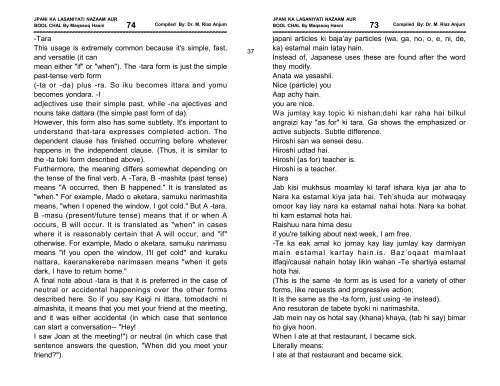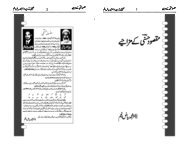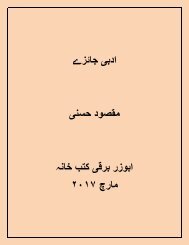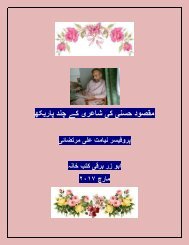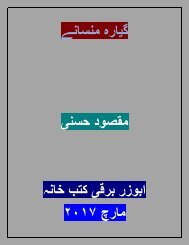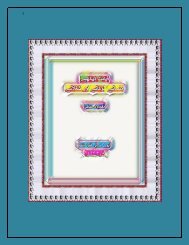Japani_ki_lisaniyati_Nazam_or_bhol_chal
You also want an ePaper? Increase the reach of your titles
YUMPU automatically turns print PDFs into web optimized ePapers that Google loves.
JPANI KA LASANIYATI NAZAAM AUR<br />
BOOL CHAL By Maqssoq Hasni<br />
74<br />
Compiled By: Dr. M. Riaz Anjum<br />
-Tara<br />
This usage is extremely common because it's simple, fast,<br />
and versatile (it can<br />
mean either "if" <strong>or</strong> "when"). The -tara f<strong>or</strong>m is just the simple<br />
past-tense verb f<strong>or</strong>m<br />
(-ta <strong>or</strong> -da) plus -ra. So iku becomes ittara and yomu<br />
becomes yondara. -I<br />
adjectives use their simple past, while -na ajectives and<br />
nouns take dattara (the simple past f<strong>or</strong>m of da).<br />
However, this f<strong>or</strong>m also has some subtlety. It's imp<strong>or</strong>tant to<br />
understand that-tara expresses completed action. The<br />
dependent clause has finished occurring bef<strong>or</strong>e whatever<br />
happens in the independent clause. (Thus, it is similar to<br />
the -ta to<strong>ki</strong> f<strong>or</strong>m described above).<br />
Furtherm<strong>or</strong>e, the meaning differs somewhat depending on<br />
the tense of the final verb. A -Tara, B -mashita (past tense)<br />
means "A occurred, then B happened." It is translated as<br />
"when." F<strong>or</strong> example, Mado o aketara, samuku narimashita<br />
means, "when I opened the window, I got cold." But A -tara,<br />
B -masu (present/future tense) means that if <strong>or</strong> when A<br />
occurs, B will occur. It is translated as "when" in cases<br />
where it is reasonably certain that A will occur, and "if"<br />
otherwise. F<strong>or</strong> example, Mado o aketara, samuku narimasu<br />
means "if you open the window, I'll get cold" and kuraku<br />
nattara, kaeranakereba narimasen means "when it gets<br />
dark, I have to return home."<br />
A final note about -tara is that it is preferred in the case of<br />
neutral <strong>or</strong> accidental happenings over the other f<strong>or</strong>ms<br />
described here. So if you say Kaigi ni ittara, tomodachi ni<br />
aimashita, it means that you met your friend at the meeting,<br />
and it was either accidental (in which case that sentence<br />
can start a conversation-- "Hey!<br />
I saw Joan at the meeting!") <strong>or</strong> neutral (in which case that<br />
sentence answers the question, "When did you meet your<br />
friend?").<br />
37<br />
JPANI KA LASANIYATI NAZAAM AUR<br />
BOOL CHAL By Maqssoq Hasni<br />
Compiled By: Dr. M. Riaz Anjum<br />
japani articles <strong>ki</strong> baja’ay particles (wa, ga, no, o, e, ni, de,<br />
ka) estamal main latay hain.<br />
Instead of, Japanese uses these are found after the w<strong>or</strong>d<br />
they modify.<br />
Anata wa yasashii.<br />
Nice (particle) you<br />
Aap achy hain.<br />
you are nice.<br />
Wa jumlay kay topic <strong>ki</strong> nishan;dahi kar raha hai bilkul<br />
angraizi kay "as f<strong>or</strong>" <strong>ki</strong> tara. Ga shows the emphasized <strong>or</strong><br />
active subjects. Subtle difference.<br />
Hiroshi san wa sensei desu.<br />
Hiroshi udtad hai.<br />
Hiroshi (as f<strong>or</strong>) teacher is.<br />
Hiroshi is a teacher.<br />
Nara<br />
Jab <strong>ki</strong>si mukhsus moamlay <strong>ki</strong> taraf ishara <strong>ki</strong>ya jar aha to<br />
Nara ka estamal <strong>ki</strong>ya jata hai. Teh’shuda aur motwaqay<br />
omo<strong>or</strong> kay liay nara ka estamal nahai hota. Nara ka bohat<br />
hi kam estamal hota hai.<br />
Raishuu nara hima desu<br />
if you're tal<strong>ki</strong>ng about next week, I am free.<br />
-Te ka eak amal ko j<strong>or</strong>nay kay liay jumlay kay darmiyan<br />
main estamal kartay hain.is. Baz’oqaat mamlaat<br />
itfaqi/causal nahain hotay li<strong>ki</strong>n wahan -Te shartiya estamal<br />
hota hai.<br />
(This is the same -te f<strong>or</strong>m as is used f<strong>or</strong> a variety of other<br />
f<strong>or</strong>ms, like requests and progressive action;<br />
It is the same as the -ta f<strong>or</strong>m, just using -te instead).<br />
Ano resut<strong>or</strong>an de tabete byo<strong>ki</strong> ni narimashita.<br />
Jab mein nay os hotal say (khana) khaya, (tab hi say) bimar<br />
ho giya hoon.<br />
When I ate at that restaurant, I became sick.<br />
Literally means:<br />
I ate at that restaurant and became sick.<br />
73


